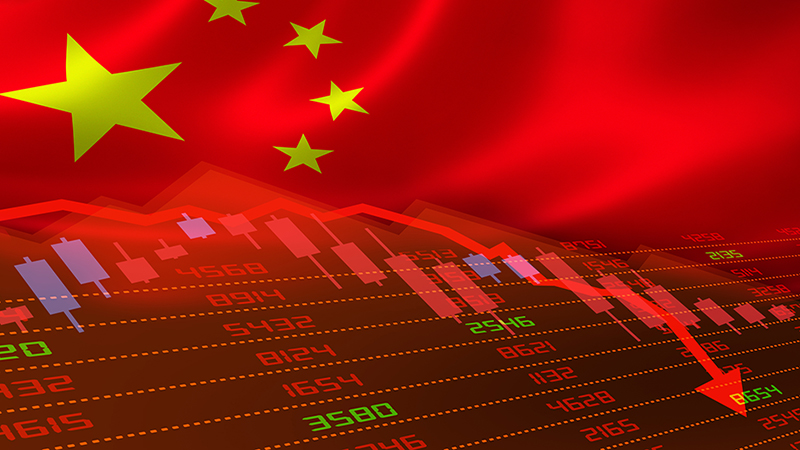It is no secret that Chinese equities have suffered from eye-watering underperformance over recent years relative to their global counterparts, for myriad reasons including slow retail sales and industrial production, a real estate market in the throes of a crisis and rising deflationary risks.
This has had a knock-on effect on global emerging market equity funds, given the country’s shares account for 30.7% of the MSCI Emerging Markets index. While MSCI Emerging Markets has lost 1.3% in total return terms over three years, MSCI China IMI has been trailing the dust with a loss of 35%.
See also: Five top-performing UK equity funds quietly achieving in an unloved sector
Using data from FE Fundinfo, Portfolio Adviser dug out the five best-performing, actively-managed open-ended funds in the IA Global Emerging Markets sector, which have a significantly smaller weighting to China than the index (at approximately 20% or under), which have also managed to achieve positive total returns over the last three years.
BNY Mellon Emerging Income – 33.1% total return
With just a 4.6% in China, the £130.7m BNY Emerging Income fund has achieved the fifth-highest total return in the IA Global Emerging Markets sector. Manager Zoe Kan, who has been at the fund’s helm since July 2019, aims to achieve both income and capital growth over five-year periods without any sector or benchmark constraints. Its largest geographical weighting is to Taiwan at more than 15%, followed by India at 13.1% and South Korea at 12.3%. It also has larger weightings to Brazil, Hong Kong, Mexico and even the UK (at 5.4%) than it does to Chinese equities. It currently yields 4.1%.
Templeton Emerging Markets Smaller Companies – 32.2% total return
Second on the list for its total return is the $402m (£318.2m) Luxembourg-domiciled Templeton Emerging Markets Smaller Companies fund, which has a 9% allocation to China.
It is headed up by Chetan Sehgal who, having managed the fund since 2017, was joined by co-managers Krzysztof Musialik and Vika Chiranewal at the start of 2020. The fund will only invest in companies with market caps of below $2bn (£1.6bn) and is subsequently benchmarked against the MSCI Emerging Markets Small Cap index.
See also: “Five US funds achieving stellar returns without riding the coat tails of the S&P 500 index“
In terms of region, its largest weighting is to India at 26.4% (a 2.1 percentage-point overweight to its benchmark), Taiwan at 15.7% (a 5.1% underweight) and 11.3% to South Korea (a 4.4% underweight). While its 9% weighting to China is much smaller than that of the MSCI Emerging Markets index, it is still a modest 80bps overweight to the MSCI Emerging Markets Small Cap.
JPM Emerging Markets Small Cap – 9.6% total return
With a higher weighting to China than the aforementioned funds at 17.5%, the $1.9bn (£1.5bn) JPM Emerging Markets Small Cap also has a significantly lower total return over three years. However, it has still outperformed the MSCI Emerging Markets index by 10.6 percentage points over this time.
Managers Amit Mehta and Austin Forey adopt a high-conviction, bottom-up approach to investing in emerging market small caps, with almost two-thirds of the portfolio held in companies which are between $1bn (£0.8bn) and $5bn (£4bn) in size.
As with the Templeton fund, JPM Emerging Markets Small Cap still has an overweight to China relative to its MSCI Emerging Markets Small Cap by 9.1 percentage points at 15.1%. However, it also has notable allocations to India, Taiwan, Mexico and South Korea.
Jupiter Global Emerging Markets Focus – 8.3% total return
Nick Payne’s $107m (£84.7m) Jupiter Global Emerging Markets Focus fund has a highly-concentrated portfolio of stocks chosen on a combined bottom-up and top-down basis, with shares in just 32 companies currently residing in the fund. Approximately 9% is held in Taiwan Semiconductor Manufacturing alone, while it also has 6.3% and 5.9% weightings in Bank of Georgia and Mercado Libre respectively.
It aims to outperform the MSCI Emerging Markets index – included reinvested dividends – over rolling three-year periods.
Payne looks for attractively-priced opportunities based on a company’s future prospects in relation to its macroeconomic environment. Its largest regional allocation is to India at 21.9%, followed by China at 20.8%, Taiwan at 16.9% and the US at 11.5%.
MI Somerset Emerging Markets Discovery – 5.4% total return
This £11.3m fund had been managed by Mark Asquith and Christopher White since October 2019. However, Angel Oritz took to its helm just last month – replacing Asquith – while White is out of the office and expected to return later this year.
The fund invests in small and mid-cap emerging market and frontier market equities, which have a market cap of below $15bn (£11.9bn) at time of purchase, with the aim of beating the MSCI Emerging Markets SMID index over five-year periods. It also has a concentrated portfolio of less than 50 holdings at any one time, with sizeable allocations to Korea-based Park Systems at 5%, Vietnamese IT firm FPT Corp at 4.8%, and the Bank of Georgia at 4.7%. The fund has an 18.7% allocation to China, which still makes it the fund’s largest regional bet.










